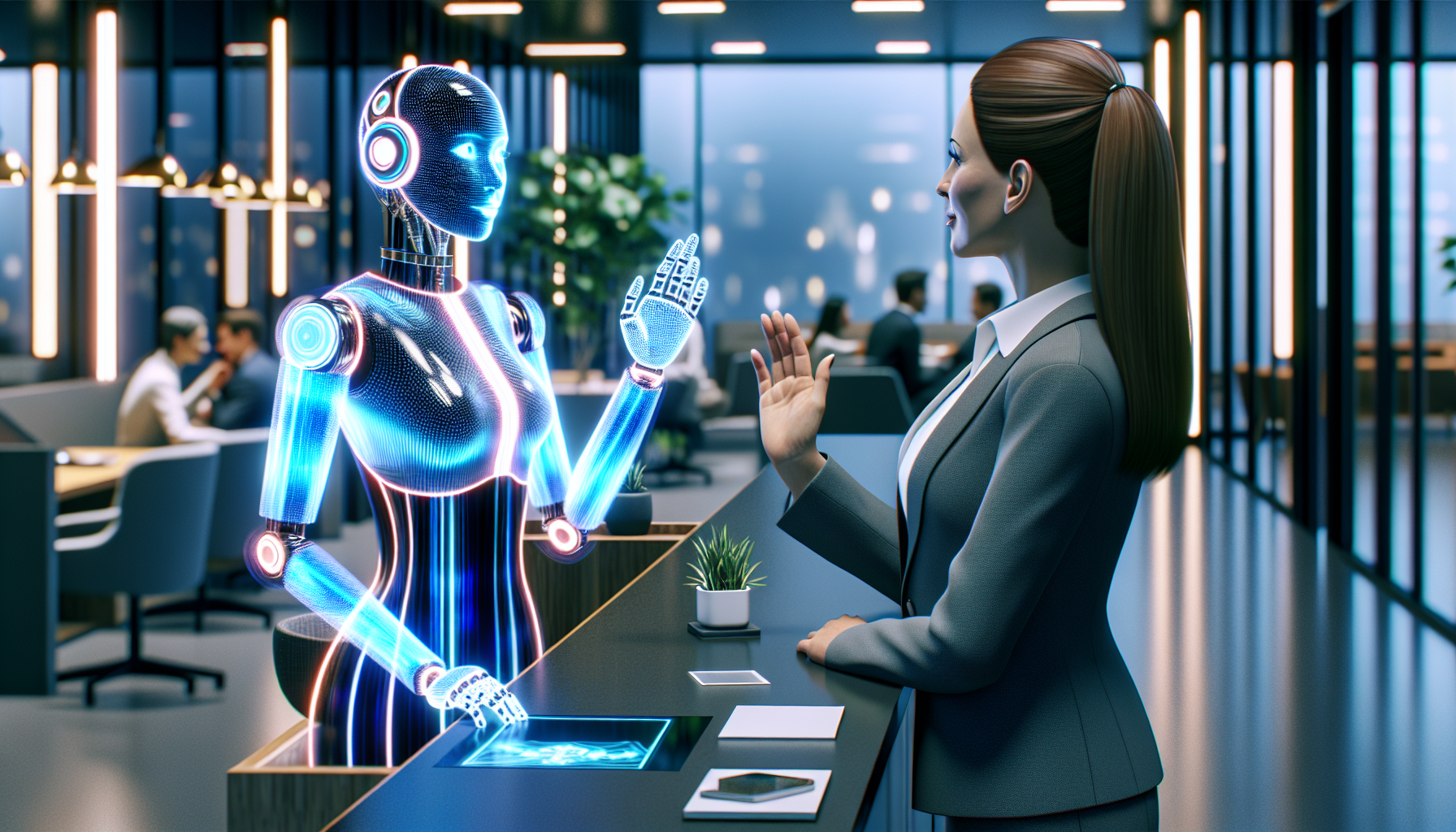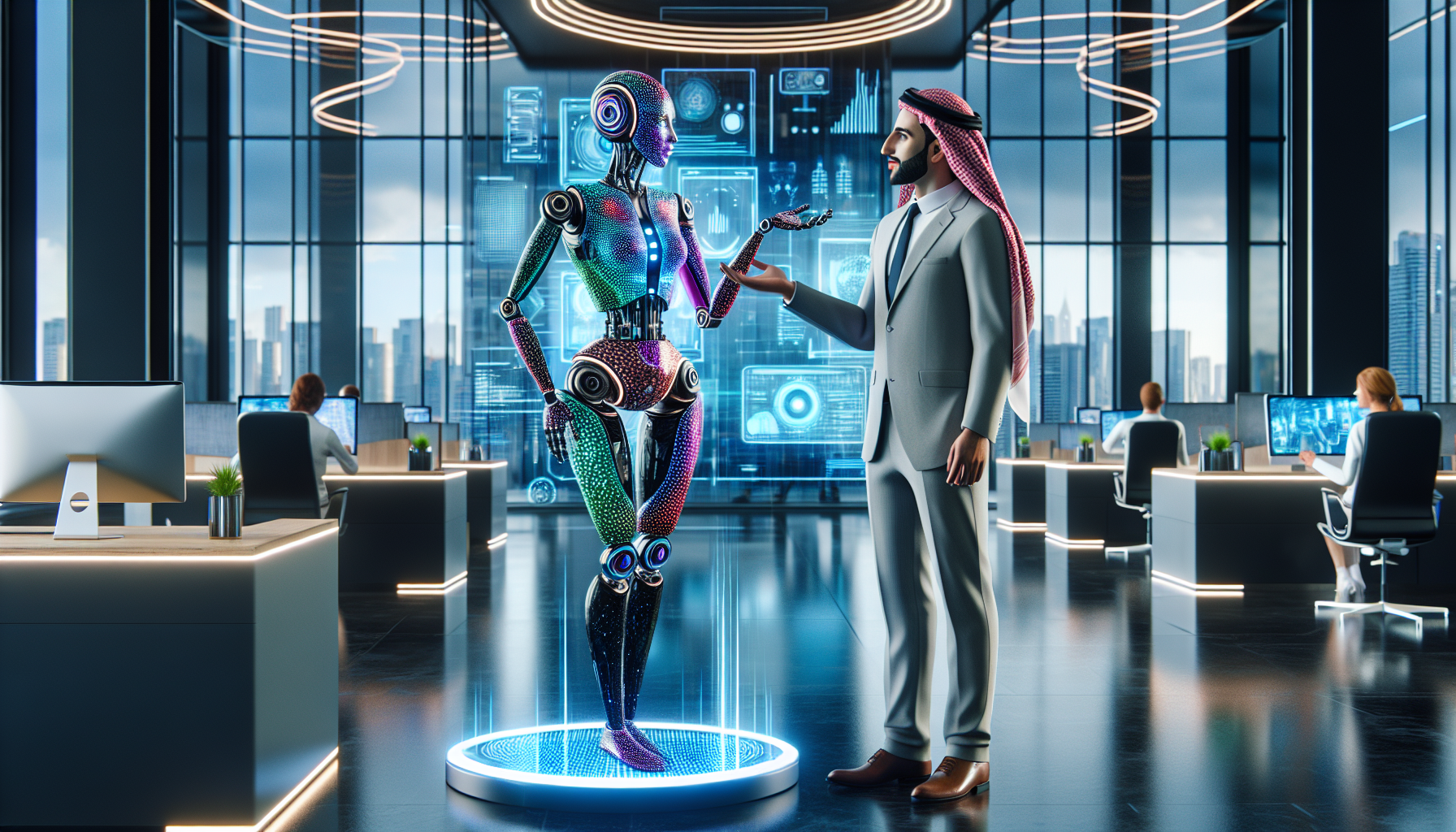
Today, the role of Artificial Intelligence (AI) in customer service cannot be overstated. Previously, human receptionists were the norm. However, given the rapid technological advancement and the increasing demand for efficiency and cost-effectiveness, the receptionist role has seen a shift. We have moved from a human-only interaction model to a mixed model where both human receptionists and AI systems coexist. This phenomenon may be attributed to the sheer versatility and reliability that AI systems offer.

AI receptionists, often manifested in AI chatbots or virtual customer service agents, provide businesses with a 24/7 customer interaction window. They handle a large volume of repetitive inquiries, freeing human receptionists to attend to the more complex customer issues and interactions. With each interaction, these AI systems learn and improve, becoming more efficient and increasing both productivity and customer satisfaction.
Adoption of the mixed model of customer service reception however, is not without its obstacles. Some customers express discomfort, preferring to interact with humans due to the belief that humans provide a more personal touch. Understanding the psychology behind this apprehension and the general human-AI interaction is crucial for businesses to successfully implement and benefit from AI reception systems.
It is imperative to note that the process of integrating AI as a customer service tool should be gradual and well thought out - introducing customers gently to these new ways of interaction. Training AI systems to mimic human-like responses may also be beneficial in bridging the gap and easing the transition.
In conclusion, AI is undeniably disrupting the customer service industry. It presents an intriguing blend of opportunities and challenges. As we continue to explore AI's potential, understanding the role that psychology plays in human-AI interactions is of paramount importance. This understanding is a crucial step towards designing AI systems that can work seamlessly and sympathetically alongside their human counterparts to deliver an exemplary customer experience.
With AI-based voice services and reception technologies such as Google's Google Assistant and Apple's iconic Siri swiftly replacing human touchpoints, understanding the psychology behind human-AI receptionist interactions has become extremely critical. It demands examination of complex aspects like trust, comfort, and levels of satisfaction.
Trust forms the backbone of any interaction, whether it's between humans or humans and AI. However, placing trust in a non-human entity carries some inherent psychological stumbling blocks1. Some people may be hesitant to trust AI receptionists due to concerns about data privacy and security, while others dismiss these uncertainties and harness the potential of AI for the convenience it provides.
Comfort level is another psychological aspect critical for human-AI interactions. Engendering a feeling of comfort in interactions with AI receptionists necessitates consistency in service quality and the ability to mimic human-like responses2. Lack of affective or emotional understanding in AI can often create a sense of unease and discomfort.
Regardless of the extent of human-likeness, undoubtedly, personal comfort varies based on demographics. Age is a significant variable - older adults are generally slower to adapt to new technologies and may feel more uncomfortable with AI interactions compared to millennials or more tech-savvy individuals. Therefore, individual predispositions and virtual literacy hold the key to determine comfort levels.
Finally, satisfaction depends heavily on reliability, efficiency, and the system's user-friendliness. While increased optimization and intelligent responses make users feel more satisfied, a learning curve or poorly designed interface can quickly lead to dissatisfaction, regardless of an individual's openness to technology.
Examining the psychology behind human-AI receptionist interaction is crucial as we move further into the realm of automation and artificial intelligence. Our understanding of these aspects can help companies develop AI receptionists that are more empathetic, efficient, and acceptable to all demographics, thereby fostering a healthy assimilation of AI into our daily lives.
In the ever-evolving landscape of AI technology, a crucial element that hugely influences user acceptance and experience is the psychological expanse of Human-AI interaction. Particularly when it comes to AI reception systems, design elements like voice, responsiveness and personality play an immense role in determining user satisfaction and comfortability.

When we consider the voice of AI, a notable example is Apple’s Siri. During its initial launch, Siri had a robotic feel. However, over the years, the company made significant improvements that resulted in a more natural-sounding voice. This authenticity in the voice facilitates users to develop trust in the technology, bridging the gap between technology and human.
Another aspect of AI receptionist design is responsiveness. Google’s Google Assistant is an excellent illustration of this. The assistant’s rapid and relevant responses not only convey understanding but also give users a sense of being understood. Furthermore, the Google Assistant's ability to learn and remember user preferences enhances this interaction, reinforcing the perception of an interactive conversation between human and AI.
The last but equally important design factor is the personality. Amazon’s Alexa is one of the potent examples where personality significantly affects user interaction. The assistant's aptitude to crack jokes and its mild sarcasm inject an element of human-like behaviour, which, in turn, helps to increase user engagement.
In conclusion, by designing AI reception systems with a focus on voice authenticity, responsiveness, and imbuing personality, we can start bridging the gap between technology and its human users. A well-thought-out design strategy can alter the perception of AI technology from being a mere tool to an interactive companion, thus enhancing user experience and acceptance in the process.
As businesses around the globe are rapidly embracing digital transformation, a new player has emerged in the customer service scene - AI Receptionists. These artificial intelligence-driven applications perform common receptionist tasks with speed and efficiency. However, the real-world response to and impacts of these AI receptionists can be contradictory at times, painting a perplexing picture of the psychology behind human-AI receptionist interactions.
According to AI and Society, the use of AI receptionists often induces feelings of efficiency and convenience. In one study, 76% of customers reported a diminished wait-time when dealing with AI receptionists, leading to an overall positive impression about the company. Moreover, a Journal of Service Research report suggests that the non-judgmental nature of AI receptionists can alleviate the fear and apprehension that some customers might exhibit in human engagements. This can lead to more authentic and candid communications, potentially serving customers more effectively.
However, it's not all rosy on the AI receptionist front. Communications of the ACM highlights varying discomfort levels among users. Their testimonials cited the unnerving "uncanny valley" effect, a phenomenon where AI receptionists almost perfectly simulate human behavior which can induce a feeling of eeriness and discomfort. This has been reported to create a rift between customer expectation and experience, thus negatively impacting the potential of customer loyalty return.
Similarly, the lack of emotional understanding and empathy exhibited by an AI receptionist can leave some customers feeling frustrated and unimportant. The Journal of Personality and Social Psychology discussed how AI receptionists often fall short in situations that require emotional intelligence, a staple component of any customer-provider relationship.
In conclusion, the psychology behind human-AI receptionist interactions remains a complex arena that encompasses elements of awe, efficiency, discomfort, and longing for empathy. The future of this industry relies heavily on the continuous fine-tuning of AI receptionists to adopt more human-like qualities, improving customer experience while maintaining the perk of digital convenience.
The future of AI receptionists is a novel frontier that looks to blend scientific advancement with psychological awareness. As technology develops, so too does our understanding of how AI receptionists affect our lives and interactions. AI is rumoured to become even more sophisticated, bringing about intriguing repercussions on human-AI relations.

Researchers speculate that advancements in neural networks and deep learning algorithms could make AI receptionists more adaptive and human-like. Iterative systems of learning are expected to help these AI receptionists understand human behaviour, emotions and subtext, a feature that is currently rather limited. In a recent study, experts discussed how improved understanding of human psychology can be incorporated into AI to ensure more engaging interactions.
However, the potential psychological impact of these advancements remains in question. When receptionists, traditionally a human role, are replaced by Artificial Intelligence, humans are devoid of the personal interaction and connection, which can lead to feeling of isolation and dehumanization. Experts emphasize the need for careful and ethical implementation of AI, to ensure it serves as a tool that enhances human interaction rather than replacing it entirely.
Renowned AI researcher Dr Shane Legg suggests that empathetic coding could be a way forward – designing AI receptionists that not only understand emotions but can empathize with human experiences. This could result in AI that judiciously maintain cordial interaction while performing their tasks with precision.
In conclusion, the future of AI receptionists holds immense promise and potential. Yet, as we charge forward, we must be mindful of the psychological ripple effects of our progress. Balancing technological advancement with ethical imperatives and psychological wellness will be crucial in determining the success of human-AI receptionist interactions in the future.
Start your free trial for My AI Front Desk today, it takes minutes to setup!








